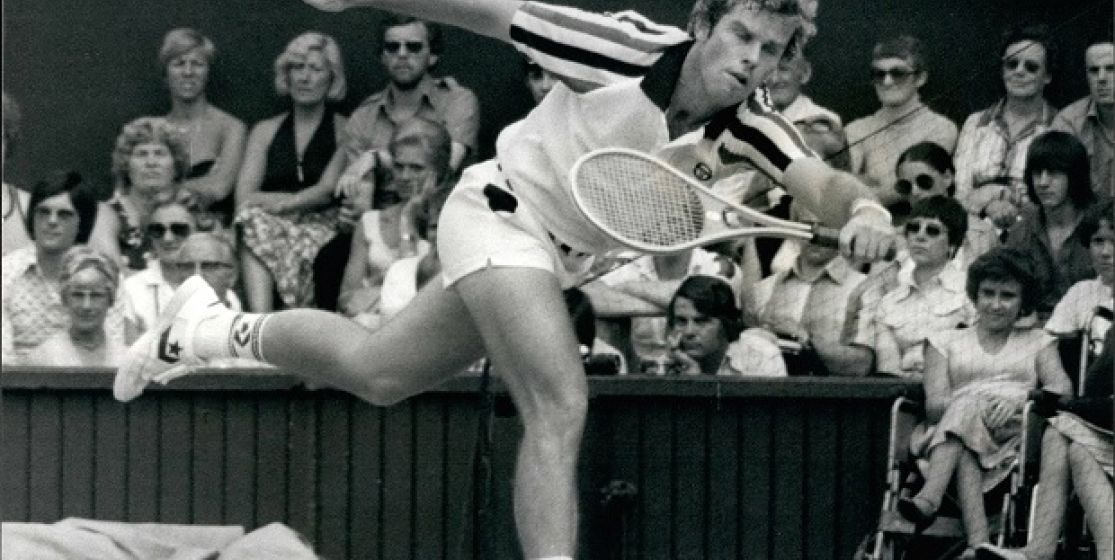He won the Australian Open, was finalist at Wimbledon and once 4th in the world, defeated all the champions of his time and is often described as a precursor of modern tennis. With such a resume, Roscoe Tanner should enjoy a peaceful retiree life, instead of which he's been accumulating multiple arrests for petty crimes. The story of an endless fall, after touching stars.
There first was the good Roscoe Tanner, a playboy with a charming smile, a figure of American college tennis before turning pro in 1972 at 21 years old, as a political science graduate. On the ATP Tour, he defeated all the champions of his era: Borg (the opponent of his finest games), Vilas, Connors, Ashe, McEnroe, Lendl, Stan Smith... He won 16 titles in singles, including the Australian Open in 1977, and a final at Wimbledon two years later. He lost a final against Bjorn Borg after a Homeric battle played in five sets. Two months later, he took his revenge on the Swede in the quarterfinals of the US Open before losing in the semi-finals against his compatriot Vitas Gerulaitis, who was two sets ahead. In his autobiography, written many years later, Double Fault: My Rise And Fall, And My Road Back, he wrote that the US Open in 1979 was both the peak of his career - the quarter-final against Borg - and the symbol of his future downfall - the incomprehensible defeat against Gerulaitis. He won his last tournament in 1981 and finally retired from the tour four years later, after many injuries.
« The rocket »
The bad Roscoe Tanner then, for his style of play, revolutionary at the time, that was foreshadowing modern tennis. A game with power and a devastating left hand service. In the era of wooden racquets, he was hitting the ball well over 125mph. At the Palm Springs tournament in 1978, one of his serves was even recorded at 152mph, a record only beaten 26 years later by Andy Roddick in a match of Davis Cup by BNP Paribas. And when the net obstructed the path, beware! On two occasions the power of the balls touched by the American broke the metal frame holding the net, which had never happened before him and what would never happen again after. A real plus that Roscoe Tanner owed to his strong, solid and muscular body. His nickname, "the rocket" perfect symbol of this offensive gunner style, always ready to run to the net and shorten the rally, and with a prize list mostly forged on fast surfaces. In the early 80s, a fatal injury to the left elbow initiated the decline of Tanner the terror. Forced to undergo surgery, he would never be the same.
Unpaid debts and hit and runs: his new specialties
It's after hanging up the racquets that he became Roscoe Tanner the Ugly. The first legal troubles started ten years after his retirement in the mid-90s. A former mistress asked for child support to raise a kid they had together. Tanner accepted at first, but failed to pay the amounts due and the case was brought to court. The former champion was forced to pay 500,000 dollars. In 2003, he reappeared in the news when he was arrested in Germany, accused of still not paying child support and of having multiplied bounced cheques in order to buy a yacht in Florida. Extradited, he was sentenced to two years in prison but was released after only one year for good behaviour. Tanner didn't learn his lesson and continued to be out of control: bad cheques, unpaid rents... Debts and hit and runs became the new specialties of the former champion stuck in a vicious circle of which he seemed seemed able to escape.
Trophies sold to pay his debts
"I know that I have disappointed everybody," he said it in a rare interview with the New York Times in 2012. "I have not represented the sport the way I should have. All these problems I've had, all those things I've done... I cannot be proud of all this." A moment of clarity didn't prevent this son of good family, former student of the prestigious Stanford University, to continue to be arrested on a regular basis for petty theft. He now lives with his third wife, Margaret. The previous one, Charlotte, sold most of his trophies, including the Australian Open won in 1977, for repayment of some of the money she claimed to her ex-husband... In vain. His former doubles partner Stan Smith tried to help him by finding him a job in Florida, but it came to a sudden end. "He was a great guy who became a crook,” bitterly admitted Anand Amritraj, another former tennis champion of his era also interviewed by the New York Times. “Everyone loved him but he always had problems with money and women. Yet if he called me today to go for a drink, I would accept with great pleasure." But it's not Tanner that would pay the bill...






